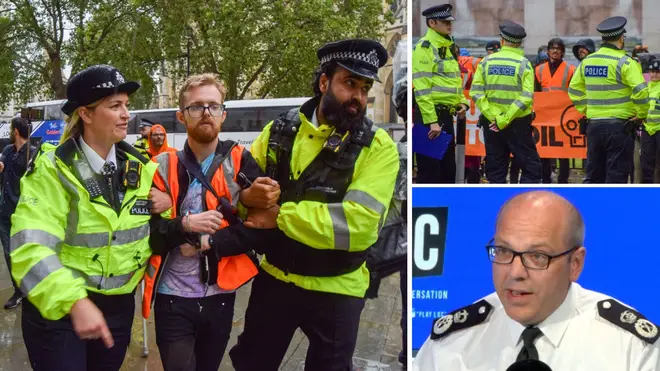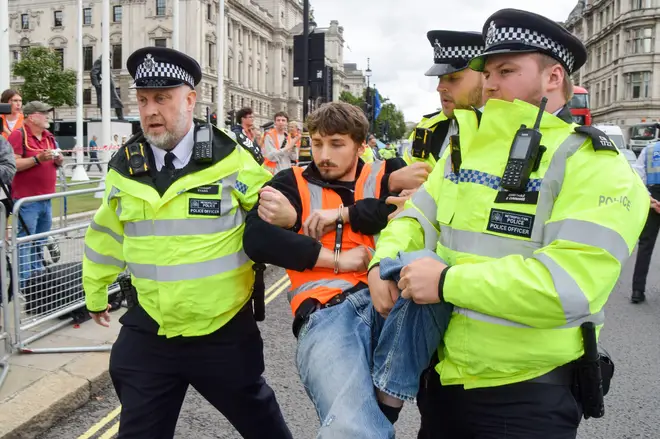
Ian Payne 4am - 7am
25 July 2023, 08:42 | Updated: 25 July 2023, 09:25

Just Stop Oil's protests have "tipped over into crime", a senior Met Police officer has said - as LBC exclusively found that slow marches by Just Stop Oil cost the force the same as the annual salary of 200 officers.
The Metropolitan Police spent more than £7.7 million responding to 515 disruptive protests by the eco-activists during their 13-week campaign of slow marches.
Figures, shared exclusively with LBC, show that the response across the city since the end of April took up more than 23,500 officer shifts.
The Met's Assistant Commissioner for operations, Matt Twist, told LBC's Nick Ferrari: "This is really unique in protest terms. In any democratic society, the right to protest is, rightly, heavily protected.
"It's something the Met well understands in terms of rights under article 9, 10 and 11 under the Human Rights Act, critically important rights.
"But this isn't protest, this is crime, and there is a difference.
"The right to protest is very strongly protected, but when you get into very deliberately causing serious disruption to the public of London, stopping people going about their daily business, stopping people going to work, or to hospital, or taking their children to school, then that tips over into crime."
He said he does not want to see people take the law into their own hands - there have been many cases of angry motorists ripping banners and forcing protesters off the streets - so officers need to clear any disruption quickly.
The Met previously said some of those officers had to be moved away from front-line community policing as they worked to clear roads and reduce chaos for commuters.
The money spent is the equivalent of paying the salary of around 200 officers or buying more than 9,000 tasers.

Since the end of April, the police force says 273 arrests were made in connection with slow marches, while Section 12 orders, which impose conditions on a protest, were issued 420 times.
On Friday, LBC reported that the campaign of daily slow marches in London was coming to an end, despite a pledge by the group to continue protesting new oil and gas licenses through other forms of civil resistance.

Just Stop Oil eco-protesters announce 'legal action' against oil and gas bosses for 'facilitating genocide'
James Harvey, one of the group's activists, said: "We can't just stop when the government is committing genocide. There are a number of tools of civil resistance – one of them is slow marching and we may see more of them in the future.
"We will use whatever means we have at our disposal to get our message across and that may include slow marches."
It's understood Just Stop Oil recruited groups of climate activists from across the UK for its three months of action, who worked on a rota of coming to London for a week at a time.
This group would slow march, cause disruption and in some cases be arrested, before returning home until their next call to the capital.
In some cases, demonstrators were moved off the street within minutes, while others who refused to comply with warnings, were arrested.
A spokesperson for the Mayor of London Sadiq Khan said: "The Mayor supports the democratic right to protest, however Sadiq has always been clear that protests must be carried out safely and lawfully and should not put Londoners or the capital’s recovery at risk.
"The extreme weather events London has experienced in recent years show how much more needs to be done to tackle the climate emergency, but protestors should consider whether their methods risk turning public opinion against a vitally important cause.
"The Mayor supports the Met’s efforts to keep Londoners safe and keep our city moving."
Over the 13-week campaign, politicians rushed to change laws around how police respond to protests, giving clarity over when officers can step in and impose conditions on a demonstration.
On Friday alone, the Met responded to 43 slow marches on roads across London.
In some cases, demonstrators were moved off the street within minutes, while others who refused to comply with warnings were arrested.